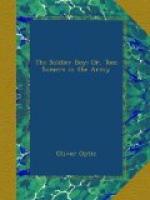“What are you doing here, then?”
“We go in for the South.”
“Go in, then!” added Tom, laughing.
“You’ll fetch up where all the rest of ’em do,” said Hapgood.
“How’s that fellow that was hit?” asked Tom, pointing to the rebel who lay in the middle of the standing room.
“I guess it’s all right with him,” replied Hapgood, bending over the silent form. “No; he isn’t dead.”
“I have it!” shouted Tom, suddenly crowding the helm hard-a-lee.
“What, Tom?”
“I see where we are. We are running up the river. I see the land on the weather bow.”
The schooner was put about, and after running with the wind amidships for ten or fifteen minutes, Tom discovered the outline of Mrs. Budd’s house, which was directly under the guns of the Union battery.
“Stand by the fore halliards, Hapgood,” said Tom, as the boat came about again. “Let go!”
The foresail came down, and Tom sprang upon the pier, as the schooner came up under its lee. In a moment the boat was made fast. By this time the pickets appeared.
“Who comes there?” demanded the soldier.
“Friends!” replied Tom.
“Advance, friend, and give the countersign.”
“Little Mac,” whispered the soldier boy in the ear of the sentinel.
“Who are you?”
“Co. K.” answered Tom.
“What’s the row? The long roll was beat just now, and the whole regiment is in line. What was that firing?”
“We have captured this boat, and five prisoners, one of them wounded, if not dead.”
“Bully for you,” replied the picket.
They were soon joined by a squad of men, and Fred Pemberton and the wounded rebel were conveyed to the hospital, while the four prisoners were conducted to a secure place. Hapgood and Tom then hastened to the parade, where the regiment was drawn up, and reported the events which had just transpired. It was unanimously voted by officers and privates that the picket guard had done “a big thing,” and they were warmly and generously commended for their skill and bravery.
Hapgood and Tom requested permission to go to the hospital and see their companion. They found that the surgeon had already dressed his wound.
“Will he die?” asked Tom, full of solicitude for his friend.
“Die! no; it’s a mere scratch. The ball ploughed into his cheek a little way,” replied the surgeon. “It isn’t a bad wound. He was more scared than hurt.”
“I am glad it is no worse,” said Captain Benson, who, with fatherly solicitude for his men, had come to the hospital as soon as the company was dismissed. “But what ails you, Tom? You look pale.”
“Nothing, captain.”
“Are you sure?”
“I don’t think I am badly hurt. I believe one of those pistol balls grazed my side; but I hardly felt it.”
“Let me see,” said the surgeon.




